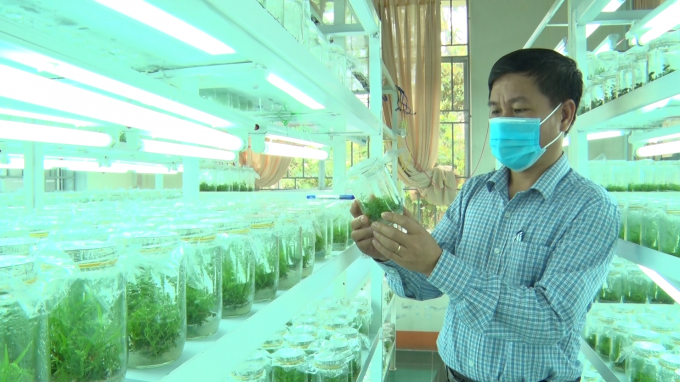May 24, 2025 | 16:26 GMT +7
May 24, 2025 | 16:26 GMT +7
Hotline: 0913.378.918
May 24, 2025 | 16:26 GMT +7
Hotline: 0913.378.918
In the North Central region, in recent years, thanks to efforts in afforestation and development of forestry production, the area's forest average cover reached 57%, higher than the national average, contributing to climate stability.

After more than a year and a half of planting, the new tissue cultured acacia hybrids have achieved an average height of about 5 m, an average diameter of 5.5 cm. Photo: PVT.
For the purpose of synchronously transferring and applying technical measures for afforestation with large timber intensive farming by using new varieties with high yield and climate change adaptation, supported by the National Agricultural Extension Center. According to experts, the Agricultural Extension Center of Quang Tri province is initiating the Project of building and developing a model of intensive afforestation of large timbers of acacia hybrid and acacia mangium in 4 central provinces including Ha Tinh, Quang Binh, Quang Tri, Thua Thien - Hue from 2019 to 2021.

Quang Tri is shifting from growing acacia hybrids produced by cuttings using acacia root systems that are prone to fall and have a low yield to varieties with good yield and high tolerance. Photo: PVT.
The implementation of the project will build several demonstration sites for large timber plantations meeting the demand for sawn timber to replace natural forest wood, help forest growers build confidence when they want to convert plans from production areas to study tours. The objective is to improve the productivity and quality of planted forests by over 30% compared to mass plantations and the economic efficiency is 1.5 - 2 times higher than that of small timber plantations.
Mr. Phan Ngoc Dong, Deputy Director of Quang Tri Agricultural Extension Center, shared that the project, after 2 years of implementation, has received a positive response from the participants, the initial results are very good. The people are very excited and believe in the success as the project's goals portrait.

Quang Tri will prioritize policies and resources to promote the introduction of new forest tree varieties into high-value commodity production. Photo: PVT.
The program has been deployed with the initial result in 2019 is 120 ha of acacia hybrid, in particular: Quang Tri 40 ha, Ha Tinh 30 ha, Quang Binh 30 ha, Thua Thien - Hue 20 ha; In 2020: 130 ha of Acacia Tai Tuong, of which: Quang Tri 40 ha, Ha Tinh 30 ha, Quang Binh 30 ha, Thua Thien - Hue 30 ha. In parallel with the implementation of models, the project has conducted training activities on afforestation in the first year, care, management and protection of forests in the following years.
According to the plan with a 10-year business cycle, the acacia hybrid sawn timber forest will achieve a timber volume of 180 m3/ha, earning VND 191.5 million/ha/10-year forest business cycle with 60% sawn timber products and 40% wood chips. The calculated profit will be VND175.2 million/ha, VND 17.52 million/ha each year, 2-3 times higher than small wood hybrid cultivation with a 5-year business cycle in terms of economic efficiency.
"In the coming time, the Agriculture and Rural Development sector will advise the People's Council and People's Committee of the province to issue policies on the application of tissue-cultured acacia hybrids in large-scale timber intensive production afforestation. We hope to increase 500 ha of this forest per year to promote the forestry transformation towards high quality and productivity, creating a raw material area that will provide uniform wood products for the deep processing of wood products, fully making use of the value of each forest type, increasing the production value per unit area.
(Mrs. Nguyen Hong Phuong, Deputy Director of Quang Tri Department of Agriculture and Rural Development)

(VAN) The People's Committee of Tra Vinh province has approved an adjustment to the investment policy for the Green Hydrogen Plant project, increasing its area to approximately 52.76 hectares.
![Reducing emissions from rice fields: [2] Farmers’ commitment to the soil](https://t.ex-cdn.com/nongnghiepmoitruong.vn/608w/files/news/2025/05/05/dsc08881jpg-nongnghiep-140632.jpg)
(VAN) Clean rice cultivation model in Thuong Tan commune, Bac Tan Uyen district, is assisting local residents in achieving sustainable agriculture by substantially reducing costs, increasing productivity, and protecting the environment.

(VAN) At the conference to disseminate Resolution No. 68, AgriS introduced its digital agricultural ecosystem and reaffirmed its commitment to accompanying the Government in promoting private sector development and sustainable agriculture.

(VAN) 'Blue Ocean - Blue Foods' initiative is designed to restore marine ecosystems and establish sustainable livelihoods for local communities by cultivating a minimum of 1,000 hectares of cottonii seaweed in the first three years.
/2025/05/21/4642-3-112707_603.jpg)
(VAN) The V-SCOPE project has made direct contributions to three out of six pillars of the Comprehensive Strategic Partnership between Vietnam and Australia.

(VAN) Facing the threat of rabies spreading to the community, Gia Lai province urgently carries out measures to vaccinate dogs and cats on a large scale.

(VAN) Disease-free livestock farming not only protects livestock herds but also stabilizes production and livelihoods for many farmers in Tuyen Quang.